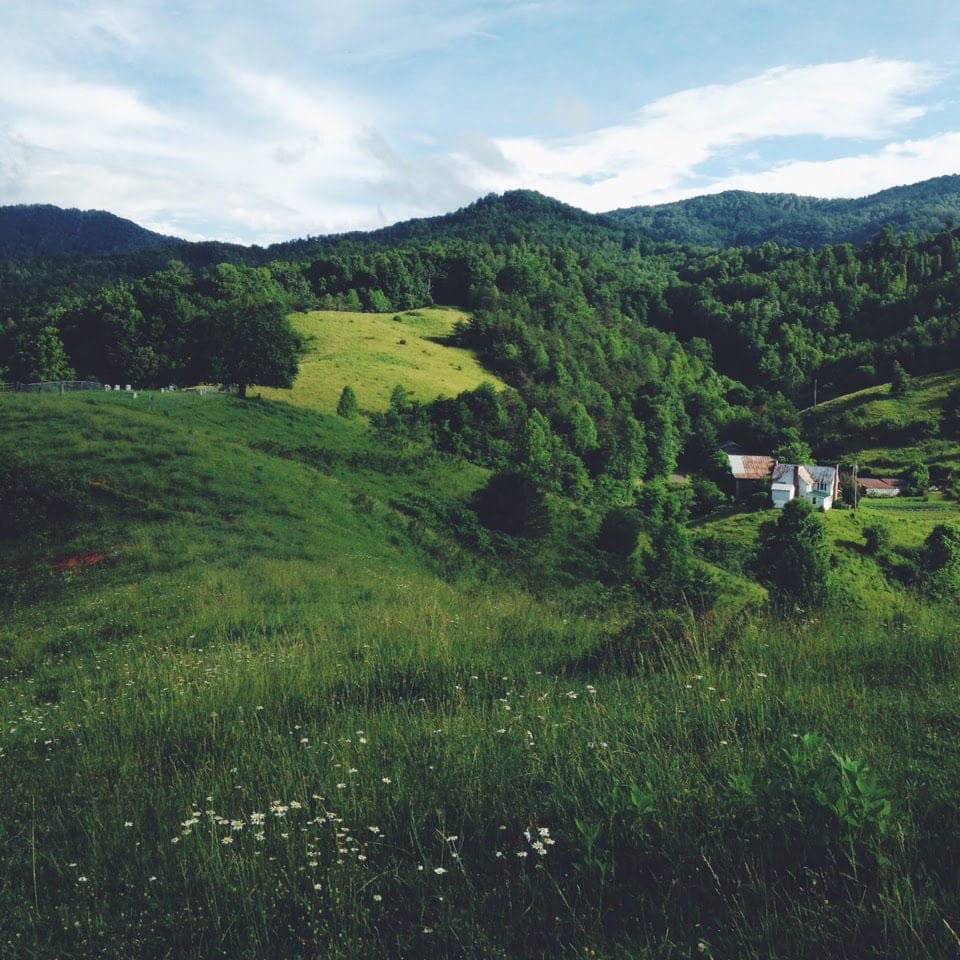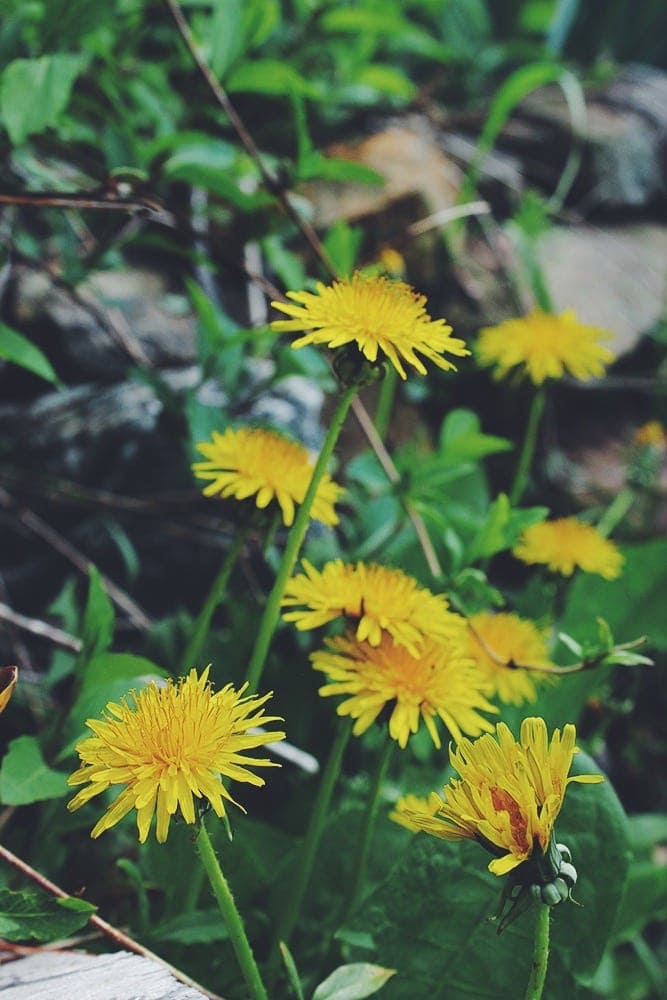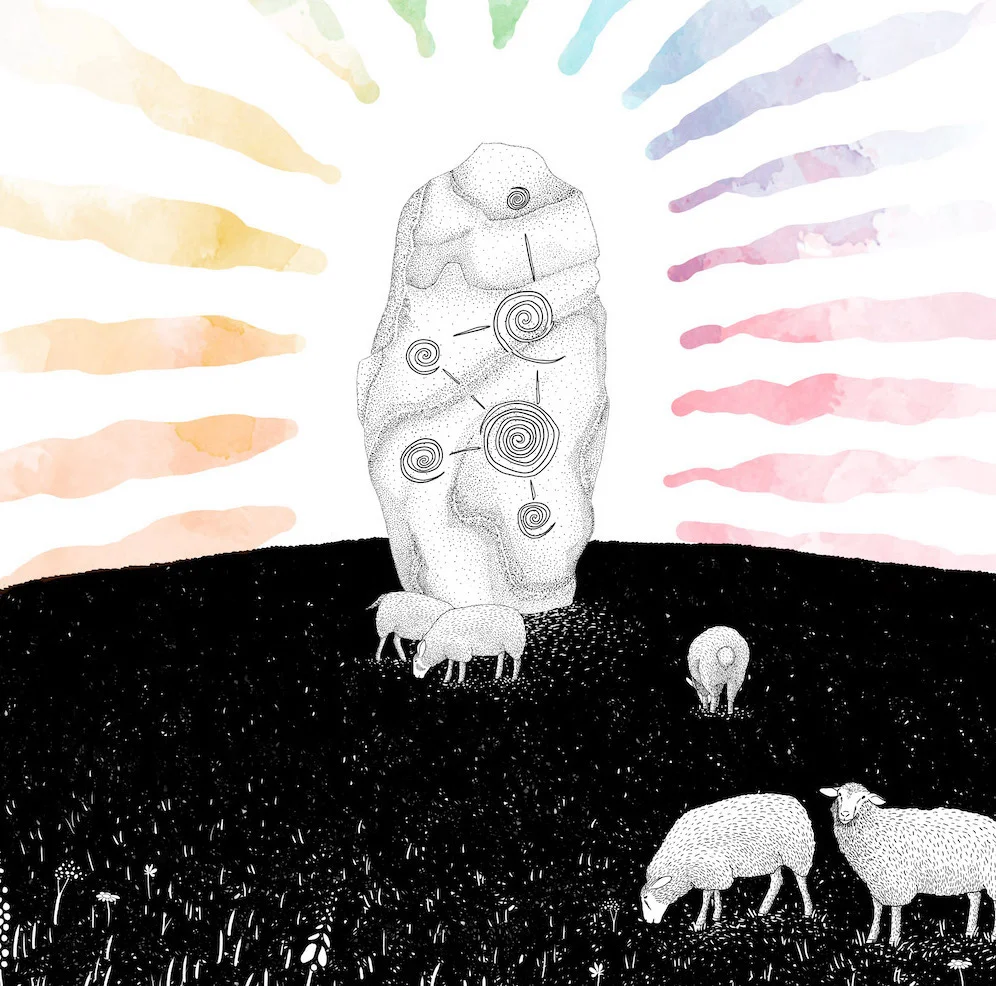How Invasives Help Us to Love Ourselves

It’s become a green wonderland here in the mountains. The basil is bunching out in the garden, weeding is now a daily activity, and last year’s daylilies are starting to bloom. But for all the plants that are welcomed, prized, and cultivated, there are an equal amount of herbs in that dreaded category of invasives.
Invasive species are, by definition, any plants that are not native and have a tendency to spread, outcompeting the indigenous flora. Because invasives thrive in places that have been disturbed, their tribe is seemingly everywhere. Though sometimes seen as noxious, these plants are often our most prized medicine in the herbal world (like nettles, burdock, and chickweed). For anyone who grew up eating honeysuckle or blowing dandelion seeds, these plants can be at the very center of our most precious memories. The only thing more pandemic than their reach, however, is the spread of our corresponding resentment.
Around this time of the year I start to see many anti-invasives campaigns popping up in my feed. Much of this work is grounded in incredible compassion for our native populations, but it seems no matter what community we live in, we are often fed more information about who to hate than who to love. In a time where immigration debates are so heated a part of me feels pain every time I hear the word “invasive”. The nuances of these two situations are, undoubtedly, different, but the vehemence is so similar it leads me to wonder — is our hatred of invasive plants, like the blind opposition to immigration, just another way our deeper knowing is asking us to take a look at our own selves (and the journey we’ve taken to get here)?

The truth is, in terms of invasive species, humans are undoubtedly at the top of this list. In light of the tenderness of this truth, is it possible that our hard tack line of dislike towards invasives is a mirror, meant to help us move towards greater self-acceptance? If we can put aside our tendency to judge these plants, could the recognition of the medicine these invasives carry help us see the medicine that we too have to give to this world?
I live next to a beautiful spring-fed creek that is slowly being covered by Japanese knotweed. In April they shoot up like alien asparagus and by May the entire top half of the creek is hidden in green. Japanese knotweed is one of the most vigorous invasives in the country. They say it takes seven years of continuously cutting back the stalks before the root will die. (At the time of writing this I am on year two, I will get back to you in 2022 with the results). It’s easy, when I’m ankle deep in the creek fighting a seemingly losing battle, to feel discouraged and resentful. Sometimes I find myself slipping into anger: Who are you to be growing here? And then I remember something life-altering. Something I can’t believe I forgot.
Japanese knotweed once saved my life. When I was in the midst of dealing with Lyme disease the roots of this plant were integral in helping me to heal. As one of the few plants that has anti-spirochete actions (spirochetes being the ancient form of bacteria that is responsible for causing Lyme disease) I have seen this plant, the same one I curse and begrudge and skin my knees to clear from the creek, help countless people recover from the depths of this debilitating disease. Sometimes I am shocked by the force of my gratitude when I finally make that connection. And that gratitude helps me to see that the power of my dislike is an often a direct reflection of my complicated relationship with my own self.

If we simply shift the wording around, it’s easy to see how the story we create around invasives is the same story we are telling ourselves about our own essential being.
Whether this is the story of our heritage, often tipped with shame if we are of settler descent, or the story we believe about the inherent fallibility of the human race. (Humans are, after all, the reason why most invasive species have entered into nonnative habitats in the first place). But, perhaps most profound of all, our reaction to invasives can help us to love what is hardest to uproot in our own psyches.
At our heart, all of us are confident, harmonious, connected, and aware of our essential goodness. But throughout our lifetimes we inevitably develop invasive thought patterns (thoughts that weren’t even our own to begin with) that start to affect our native ecology of self-esteem. How many of us are plagued by the belief that we aren’t enough? Or maybe that we are too much? Just as invasive species typically only move into ecologies that have been disturbed, these self-defeating thoughts usually arrive in the wake of trauma. Like blackberry vines, these thoughts originally come in to protect us from further damage, keeping us safe as we regenerate from the hurt. As restrictive as these thoughts become, however, if we can only lean in, these interlopers have so much to teach us about grace.

There is an old Daoist saying that acceptance leads to gratitude, and gratitude leads to grace. It’s easy, when I’m ankle deep in the creek cutting back knotweed, to feel resentful. But inevitably, I begin to enter into a Zen-like zone of concentration. Bend, clip, swish. I stop fighting the fact that the knotweed is here, and I accept what is, including my role as someone who can help the native plants return. Bend, clip, swish I accept myself as someone who is also a non-native to this land, and yet cares so deeply for this place. Bend, clip, swish. I recognize that all the ways that I tell myself I’m not enough is just another reaction to the challenges I’ve been handed.
Bend, clip, swish. The gratitude begins to settle in. For the tenacity of this plant. For the jam I will be making from its stalks and medicine I’ll bottle from the roots. Gratitude for the ability to stay present with myself as I grow, for my willingness to continually show up with my pruners when my own negative thought patterns crop up again and again.
Bend, clip, swish. Somewhere within all this motion the resistance finally drops away. And, like a shaft of light reaching through the new space I’ve opened up in the canopy, sweet grace comes streaming in.
Grace, that sense of elegant goodwill and natural divine alignment, is often just around the creek bend if we can learn to become present with what is. So, if you needed to hear this today, let this grace come streaming into your world. Because, it turns out, that no matter who you are or where you come from, you can always belong to this place called the present.




I really needed to read this. I have some invasives I’ve been battling, and it bothers me that, like you said, we often read more about the plants (or people) we should “hate” than about who we can love. Much to ponder here. (I wonder if winter creeper has medicinal value. Probably!)
Hi Barbara! We’re glad you’re thinking about invasive plants in a new way! We think all plants have value…although sometimes the value isn’t medicinal. 🙂
Thank you Asia for writing and sharing this perspective. I studied wildlife biology in college and this was one of the hardest topics for me to swallow. I felt as though our approach to eradicating invasive species seemed to be lacking any sort of love and compassion, as I could not separate Mother Earth from the weeds. When I interned at a national park after graduating, we would spend 2 days a week with science and resource management eradicating invasive species. It felt like we were at war. And this experience made me pause and wonder, is it possible to do this with love? Your words have helped me put something together that I have not been able to on my own. That intention is everything. We can do the work, and with love and gratitude in our hearts. Instead of a fight or resistance to what is. I also see the destruction of the natural world as a mirror, reflecting the deep fears and sadnesses humans feel when we have been taught (and believed) that we are separate from our mother earth. I hear and see the hurt that has come in the previous comments and honor their space. Thank you thank you for your bravery in sharing your story with knotweed. I believe that your profound acknowledgment and gratitude has the power to shift our world, as I see the alchemy coming from within. I am so grateful for your words and your work.
I am an immigrant to the US and I feel no connection to resenting me and raising awareness about the issues of invasive plants. Indeed people who have told me they don’t like immigrants have yards full of invasive plants. Trying to take peoples resentments of different skin colors and languages and comparing it to the loss of biodiversity and extinctions is just wrong.
I do find it hard to look at invasives and not feel the terrible destruction that humans have wrought on the world. Your article does remind me though of a piece I read recently about the fact that extinction is an inevitability for all life forms so humans shouldn’t interfere to pick the winners and losers by choosing which ones we are willing to help. In the east we are seeing all of the ash trees dying because of the invasive ash borer beetle. We could see the way it is helping woodpeckers with all that dead wood but I feel only sadness for the 70 species of tiny native bugs whose lives depend on native ash and may go extinct as a consequence. So should we just accept their fate or work to raise awareness to release the tiny parasitic wasp that preys solely on emerald ash borers and thus keeps their numbers in balance?
I feel sad for my children and one day grandchildren that we will pass on a world with less beauty. The invasive lesser celandine that blankets the forests here in spring is flashy and gaudy compared to the delicate beauty of native spring ephemerals, dwarf ginseng, trout lily, toothwort and spring beauty – whose loss may cascade into the loss of the spring beauty bee which collects pollen only from that flower.
Once widespread, it is probably impossible to remove any invasives but that doesn’t mean we shouldn’t continue to try to remove them from natural areas and hunt for biological controls so these plants and animals can coexist with the native ones rather that dominating and destroying.
My fear is that by accepting these invasives we give license to people to continue planting them and not consider the risks that bringing new plants from around the world to our gardens entails. Admire their abitility to take advantage of every opening people have given them, harvest and eat ones that can be eaten but all the articles about ‘ecological benefits of invasives’ are just people trying to justify the damage humans are doing. Honestly that book actually claims that invasives increase biodiversity by increasing the number of species as if that was the only measure of importance. Yes there are now more plant species in the state parks but there are less of the native ones that feed the bees, butterflies and birds. Japanese honeysuckle produces berries that birds love but they are high in sugar rather than fat like native berries and so don’t give them the fuel reserves to fly to Central America. And no caterpillars feed on them so the is no baby bird food to grow next year’s birds. Having more bird species by adding house sparrows and starlings doesn’t help when thee are less warblers! Please don’t fall for the sloppy arguments used in these books. Keep cutting the knotweed AND explaining to others why this is important and that we should be mindful of the impacts on our world of the things that we grow, p.
Where is the line between acceptance and complacence, I wonder? Being someone whose passions revolve around native plants, eco-system restoration and helping our struggling native species survive in the face of so much human-caused stress and destruction, I agree with Karen. When it comes to nature, humanity overall has proven to be an arrogant, self-centered and entitled species, always thinking we know better than natural systems do. The worst of the non-native species do real harm. And they exemplify how Western colonialist attitudes and practices continue to destroy indigenous life in all forms, which is the tragedy of the world. I think we humans should accept our culpability and work to make amends (in my case through native gardening and yes, eradication of invasives). So you see, my guilt does serve a positive function. 🙂 Good for you for battling to rescue your creek from Japanese knotweed, you are doing your part!
The problem with this kind of thinking, is that it is highly anthropocentric. Yes invasive plants might teach you something about yourself, and yes they can be medicinal, but this is all from the perspective of how they are benefiting YOU. What about the rest of nature? We know that invasive species have many detrimental impacts on our ecosystems – biodiversity is reduced, species go extinct, erosion increases, land is permanently altered, and not for the better. To only see how it might be benefiting you is to completely ignore ecology. A truly connected person to nature would step outside themselves and see what impact they are having on the creatures that live there. This mentality is couched as a loving approach when it is actually quite lazy (“Look see, nature is deteriorating but I don’t have to do anything bc it still benefits me!”) and narcissistic. You can interpret what invasive plants might mean to your own psyche, but this by no means absolves our human responsibility to so something ab the mess we’ve created. And the comment on comparing immigration to invasive plants – those are two entirely different things. One is from the human world, the other is the world of nature, which operates on an entirely different set of principles. You are comparing two totally unrelated things.
Hi Karen — My work is based on the belief that the vast majority of ecological destruction and disharmony created by humans on this planet is the direct result of the ways we suffer from self-criticism, self-judgment and ultimately self-harm. I use my writing, and my connection to the plant world, to help others to see themselves and their goodness, as I believe self-compassion is a deeply important piece of healing for the world at large. You do not have to agree with it, but this is the nature and focus of my work, my writing and this space as a whole.
In terms of invasive species, I do also believe that there is much more than meets the eye in terms of their overall impact, and that we are learning more every day. If you or anyone else reading this piece are interested in more on this unconventional perspective, including research into the possibly ecological healing properties of invasives, I suggest the book Invasive Plant medicine: The Ecological Benefits and Healing Abilities of Invasives by Timothy Lee Scott.
Interesting you do not see humans as part of nature. I sometimes entertain the thought that is the crux to most of our problems. We are a part of nature, we have just forgotten how to be.
Thank you.
I loved reading this. So much gentle wisdom and grace. Thank you.
The invasive species here is Old man’s Beard on our land in NZ, a clematis type vine that smothers even mature trees and that grows back from tiny sections of stalk. I have tried to find uses for it, but it is toxic… I have always felt that hating it is not the right approach and that it just is a mirror for me in terms of my overwhelm at fighting things. I have resorted to ignoring it for a few years but that clearly isn’t the answer either. I will look at this plant again, hopefully with more grace. Much love to you and thank you for the Pussy Portal. It has come into my life at the perfect time.
Thank you for this reflection Verena, I’m grateful to connect with you here and in the Portal! Sending you much love.
i like the idea of shifting the focus from eradicating something hated and reviled and “foreign” to actions that are based in love and protection of what is vulnerable. i suspect that we humans may be just as fallible in our perspective of protecting native species as we were in bringing non-natives into places deliberately or accidentally…
It reminds me of that old adage: “what you focus on will grow.” Thank you for framing this idea here!